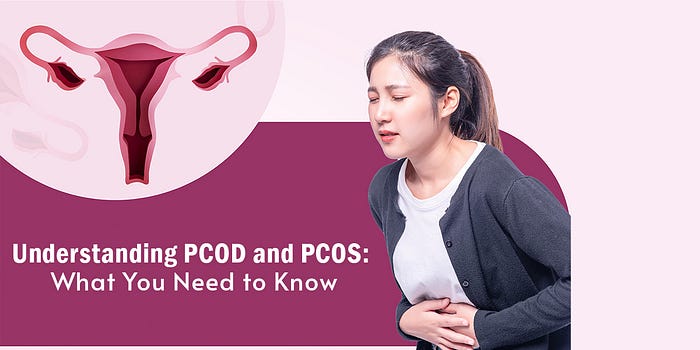Understanding PCOD and PCOS: What You Need to Know : Ayursesha

PCOD and PCOS are two most common health conditions existing these days in females. They are used interchangeably quite often but they are not the same. However, they both impact the ovaries and also affect overall physical health as well as fertility. If you also often remain confused about what they both actually are and how they are caused, here is a treasure of information for you. This will give you a better insight into the same.
PCOD: What does it mean?
PCOD stands Stands for Polycystic Ovarian Disorder and is caused when multiple follicles or cysts form in ovaries. Most of the time, these cysts are actually harmless however they can result in hormonal imbalance in the body that can further cause multiple health issues especially affecting the reproductive capability of women. PCOD is a broad spectrum term that includes multiple problems caused in ovaries and are somewhat similar to PCOS but remember that they both are different conditions despite similar symptoms.
PCOS: What does it mean?
Pcos means Polycystic Ovarian Syndrome that results in hormonal imbalance and is a subset of PCOD. In this condition the ovaries get enlarged having small cyst characterized by hormonal imbalance. This is one of the most common problems in women and can also cause fertility.
Causes of PCOS and PCOD
There can be multiple causes of both PCOS as well as PCOD but the maximum role is played by hormonal factors and genetics. Another possible factor is insulin resistance in which the body is not able to respond in an efficient manner. Overall a broader term categorises the underlying cause that is an unhealthy lifestyle along with obesity and internal inflammation.
Symptoms
There are multiple symptoms of PCOS and PCOD and many of them are common as well due to which people often get confused between the two. The symptoms include the following:
- Prolonged Periods or Heavy Flow
- Pelvic Pain
- Infertility or difficulty in conceiving
- Depression/Mood Swings
- Excess Hair Growth
- Irregular Period Cycle
- Oily Skin/Acne
- Weight Gain/ Weight loss resistance
- Fatigue
Diagnosis Procedure
In order to diagnose PCOS and PCOD, many laboratory tests need to be conducted along with a physical examination and the medical history also needs to be taken into account. The hormone levels of insulin and testosterone need to be measured and an ultrasound also might be required in order to see a view of the ovaries and the cysts.
Health Issues/Risks
These two conditions can cause some health complications if not treated on time the risks they pose to the female body include the following:
- Infertility: It is one of the most common side effects of PCOS and PCOD as the ovulation gets irregular due to hormonal imbalance hence resulting in difficulty for conceiving.
- Cardiovascular Issues: PCOS and PCOD where obesity is the underlying cause can also result in cardiovascular issues that can pose a risk of heart disease as well as high BP.
- Diabetes: Since insulin resistance can also be a common side effect of both they can increase the chances of having type two diabetes.
- Endometrial Cancer: As PCOS and PCOD can cause irregular periods, this can make the inner lining of the uterus thick hence increasing the chances of getting endometrial cancer.
How to Deal with both?
There is no specific medication available for PCs and PCOD both can be treated by managing the symptoms and reducing the intake of things that elevate the symptoms and risks.
- Medications: As already stated above, there are no medications directly available for PCOD and PCOS however, certain contraceptives along with anti-androgens can be prescribed by a doctor for regulating the menstrual cycle and other symptoms associated with PCOS and PCOD.
- Lifestyle Changes: Living a healthy lifestyle is one of the best ways to counter the symptoms of these disorders. Try to workout regularly and eat a healthy diet full of nutrients and also make sure to manage your weight as it can work to reduce the symptoms that aggravate the imbalance in the body.
- Surgery: In rare cases, certain surgical procedures can also be done in order to control hormonal imbalance and increase ovulation.
- Fertility Treatments: Females who face difficulty in conceiving due to these disorders can opt for certain fertility treatments like IVF.
Conclusion
These are very common conditions that don’t have a fixed course of treatment as the only way is to reduce the activities that aggravate the symptoms and live a healthy lifestyle. If you notice any change in your menstrual cycle or any other health condition that you suspect make sure to reach out to the doctor at the earliest.

Comments
Post a Comment